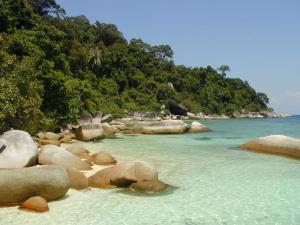Tomorrow, January 15th, marks the official launch date of Wikivoyage, the new free travel guide from the Wikimedia Foundation. Born from a split with Wikitravel, here are six reasons it’s already better than its ancestor.
- Wikivoyage has a great mobile version. This uses the same systems as the massively popular mobile version of Wikipedia, and is thus fast, compatible with virtually every device, and close to bug-free.
- Wikivoyage supports scrollable, zoomable web maps, courtesy of OpenStreetMaps. These are so new there aren’t many around yet, but here’s an example from the Italian page for Funchal; expect to see plenty more soon.
- Wikivoyage lets you collect articles into books, which can be turned into a PDF or EPUB for offline reading, or shipped to you as a printed book. (And thus Wikivoyage Press came to life at the flick of a switch. D’oh!)
- No more screen scraping: full data dumps of Wikivoyage are already available. Thanks to the Creative Commons license, you can freely use this data for travel mashups and more.
- Thanks to its active community, Wikivoyage already gets more content updates, and has spam firmly under control thanks to the Foundation’s years of experience in combating it.
- Last but not least, Wikivoyage does not suck: there are no punch-the-monkey ads, in-your-face flight booking dialogs, database backends that flake out randomly when you’re trying to edit, or company-appointed admins who censor and ban at will.
So what does this mean in practice?
Short term impact
As part of the launch, every Wikipedia page that once pointed to Wikitravel will now start pointing to Wikivoyage instead. In addition, every Wikipedia page will temporarily be festooned with a notice pointing to the site, which means a cool 6.5 billion ad impressions a day. The traffic boost from these will be massive, so you can expect to see a lot more Wikivoyage in your search results quite soon.
 This is not to say it’s all peaches and cream, as the site remains a work in progress. For example, while merging Wikivoyage’s image backend with Wikimedia’s Commons allowed access to a wealth of new pictures and illustrations, it also means that several thousand pages now have broken image links. These are being fixed one by one, and the backlog has already been cut in half since mid-December, but plenty of work remains.
This is not to say it’s all peaches and cream, as the site remains a work in progress. For example, while merging Wikivoyage’s image backend with Wikimedia’s Commons allowed access to a wealth of new pictures and illustrations, it also means that several thousand pages now have broken image links. These are being fixed one by one, and the backlog has already been cut in half since mid-December, but plenty of work remains.
Long-time readers may also recall that there was a complicated tangle of lawsuits between Wikitravel’s owner Internet Brands (IB), some of its erstwhile users, and the Wikimedia Foundation. The first lawsuit, by Internet Brands against two Wikitravel users, was dismissed on November 28, 2012, and although they could technically try again in state court, IB appears to have given up (unsurprising, as they had no case). The second and arguably more meaningful lawsuit between the Wikimedia Foundation and Internet Brands is still rumbling on though, with both sides stomping around the sumo stadium, slapping thighs and grunting menacingly, but no court date set. Keep an eye on the Wikimedia blog for updates; nonetheless, the Foundation has stated that this will have no impact on Wikivoyage itself.
Long term impact
While I have no doubt that Wikivoyage will surpass and supplant Wikitravel, its impact on the wider travel industry remains an open question. For Wikivoyage to become as globally ubiquitous as Wikipedia, at least some of these hard problems will have to be cracked:
 Clearer separation between objective and subjective travel information. Wikis are great for “the train takes 15 minutes and costs $2.50”, but not so much for “the pizzas are great and the music rocks”. Allowing multiple comments, reviews or ratings of some kind for listings is needed.
Clearer separation between objective and subjective travel information. Wikis are great for “the train takes 15 minutes and costs $2.50”, but not so much for “the pizzas are great and the music rocks”. Allowing multiple comments, reviews or ratings of some kind for listings is needed.- Building a database backend. Wikivoyage articles are long, flat pages of text, with a little markup for points of interest and geographical hierarchy. Turning them into anything other than pages of text, or even getting the various language versions to share information, would require reworking the site to use a database of some kind, not a trivial exercise, although it would definitely be an intriguing application for the budding Wikidata.
- Lack of vision and desire. To a first approximation, the Wikimedia Foundation allocates its meager resources based on site popularity, which is why Wikipedia gets almost all of the love and the Foundation will have precisely zero Wikivoyage people on staff. This means that not only is the Foundation unlikely to be able to make the large investments needed to bring the site to the next level, but there won’t even be anybody who could direct those investments if the money and will suddenly came up.
- Lack of funding. That money is unlikely to come up, though, since Wikimedia is funded entirely by donations and the vast majority of them go to pay for Wikipedia. While adding eg. hotel bookings to Wikivoyage would be a near-guaranteed money spinner and, if done right, a genuine enhancement to the site, it would be an uphill battle to get the occasionally rabidly anti-capitalist wider Wikimedia community to accept this taint of Mammon.
I should probably underline that I’m not trying to rag on the Foundation with those latter two points, they’re operating quite sensibly with the constraints they have as a non-profit organization.
This also explains why, as a travel industry insider myself, I don’t think Wikivoyage poses an existential threat to TripAdvisor, Google or, for that matter, Lonely Planet: it’s simply not playing the same game. Quite the contrary, it promises to be a great resource of information for everybody. In the same way that Google pulls in data for Wikipedia for its search results and Lonely Planet’s website uses images sourced from Wikimedia Commons, other travel guides will be able to complement their own content with additional data from Wikivoyage.






